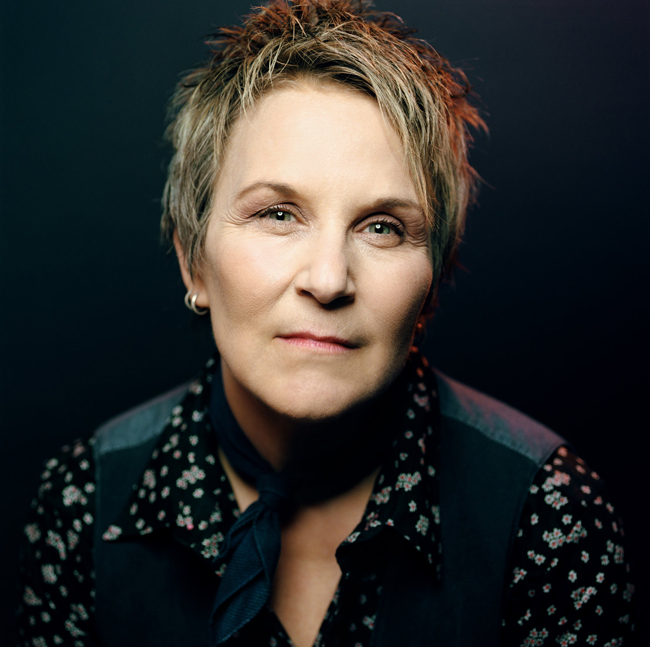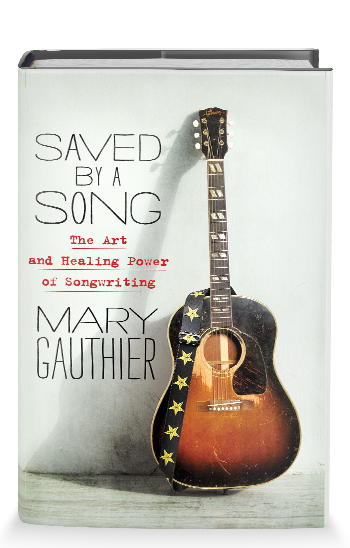
Saved by a Songwriter
Singer Mary Gauthier previews her new book in advance of her Houston appearance.

Anyone familiar with the brilliant songs of lesbian singer/songwriter Mary Gauthier won’t be at all surprised to learn that she also has an undeniable gift for writing prose. Her first book, Saved By a Song: The Art and Healing Power of Songwriting (St. Martin’s Press, 2021), which I would describe as both a memoir and a how-to manual, is as personal and revealing as her music. Over the course of 13 songs (11 originals and two by others—John Prine’s “Sam Stone” and John Lennon’s “Mother”), Gauthier takes the reader behind the scenes with stories about how the songs came to be, while also delving into the process itself. It’s a fascinating read for both songwriters and fans.
Gauthier was kind enough to talk to OutSmart prior to her Houston shows at McGonigel’s Mucky Duck on July 23 and 24.

Gregg Shapiro: Mary, your book Saved By a Song: The Art and Healing Power of Songwriting, is a memoir and gentle-songwriting-manual hybrid. Was that the intention all along, or did it begin as one or the other?
Mary Gauthier: This was a six- or seven-year process. I wrote a book before this for Yale University Press. They wanted a straight-up book on songwriting. Then the guy who signed me to Yale left the press. He moved to Berkeley and is running a beautiful nonprofit press out there called Heyday. When he left Yale, the book kind of got shelved. So, that book went away. I had that manuscript, which I’d spent years on, and then I connected with St. Martin’s Press. They wanted to see that manuscript. They liked it, but they wanted something more interesting to people who are not songwriters [while still appealing to] songwriters. It was their idea, and I love it, to pick stories from my life that [provided] inspiration for songs or deepened my understanding of songwriting. I think it’s a better book, actually, because straight-up instruction books on songwriting kind of don’t give you a context for where all these lessons come from. What I’m trying to teach and show students is that they come from your life. Where else could they come from?
You wrote that your hope is “to encourage courage” when it comes to songwriting, but you also don’t hesitate to write about your own songwriting frustrations. Would it be fair to say the book is as instructional as it is cautionary?
Maybe not cautionary, but just letting songwriters know that if you ever think this is going to get easy, forget about it! This is hard. What we’re trying to do with a song is what a novelist tries to do in 700 pages. We’ve got three minutes. If Leonard Cohen was still alive, he’d be the first one to tell you this is hard. “Hallelujah” took something like seven years and 50 verses to get to the song that we know and love today. The only songwriter who makes it look easy is Bob Dylan, and there’s [only one of him] in all of history. I think it’s not necessarily cautionary, but more like, “Hey, don’t expect it to get easy. In fact, the further you go, the more you’re going to see that this is always about roaming around in the darkness trying to find the light.”
In chapter 2 you say, “To sound like myself, I had to reveal myself.” I think that is reflected in the way you have spoken and written honestly about your path to recovery, which includes 30 years of sobriety. What would it mean to you to have your book embraced as recommended reading for the recovery community?
That would be tremendous. I think that’s what I’m getting at, that I wouldn’t be a songwriter if I hadn’t gotten sober. And I wouldn’t have gotten sober if I hadn’t gotten arrested. I figured that was as good enough a place as any to start the book: in the car, drunk, with sirens behind you. Very, very scary. [Laughs]
My heart was also racing when I was reading that part. Also notable is the way you address queerness in your life and your music—from the Indigo Girls concert you attended to your songs “Goddamn HIV” and “Drag Queens in Limousines.” In the years since you’ve been writing and recording music, what do you think of the way that LGBTQ+ musicians have been embraced by audiences from all walks of life?
That’s a great question! I was telling my partner, Jaimee, that this is the year of the warm embrace. We’ve hit a critical mass this year. I get requests from the Americana Music Association—“Please send us a quote about your story, Americana music, and Gay Pride Month, directed to people who are on our Instagram.”
We spoke in early 2020, right before the Grammys (for which you were a nominee) and right before the COVID-19 shutdown. At the time, you mentioned that you were working on Saved by a Song. As unfortunate as the situation was, did the isolation provide you with the time to focus on the book?
Well, it helped me finish. I was able to really get in there and do the editing necessary. I had to chop away a lot—reduce, reduce, reduce. As Guy Clark used to say, “Let go of some of your darlings.” It did give me that time. The first 90 days of the pandemic were all book for me. We finished it up with the help of a great editor, and a willingness to remove some of the stories (which I thought were really well told, and I’d worked on for years) that just didn’t belong in this book. It also gave me time to slow down and heal. After the Grammy nomination, it felt like a rocket ship. I was working 160, 170 shows a year. I just wasn’t home. To go from being always gone to full brakes, I was getting whiplash. But I needed it.
Did you find other creative ways to pass the time during the pandemic, such as performing livestreaming sets?
Yes. We’ve done a livestream every Sunday since early April 2020. We still are doing them, although I think as we pick up the touring, there’s going to be fewer and fewer because we’re traveling every Sunday. I brought a guest on every week, and that’s been a lot of fun and a way to see my friends. Have them as my guest and we get to hang out. Also, doing things around the house has been great. I got my second garden going back there. We’re dealing now with zucchini, which is awesome. Most everyone I brought in to livestream has been saying it’s incredible to be in one place for an extended period of time, because none of us had been doing that in such a long time.
Now that the book is finished, have you started thinking about or working on your next album?
Yes. I’m going to record it in December. What we’ve got right now is a vinyl shortage situation. Record companies have had to put the brakes on, because the vinyl companies are under water. But I’m just about ready to go—I’m maybe two songs shy of a new record. But the business end is nowhere near ready. They said do it in December and we’ll put it out in late spring and hope that vinyl will be somewhat caught up by then. We’ll see. But I’m close!
What: An Evening of Stories and Songs with Mary Gauthier
When: 7 p.m. on July 23 and 24
Where: McGonigel’s Mucky Duck, 2425 Norfolk St.
Tickets: mcgonigels.com
This article appears in the July 2021 edition of OutSmart magazine.










